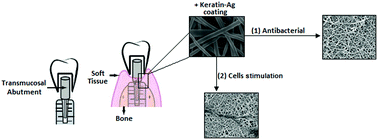Silver-doped keratin nanofibers preserve a titanium surface from biofilm contamination and favor soft-tissue healing
Abstract
Peri-implantitis is a severe condition affecting the success of transmucosal dental implants: tissue healing is severely limited by the inflammatory processes that come about to control homeostasis in the surrounding tissues. The main cause of peri-implantitis is bacterial biofilm infection; gingival fibroblasts play a pivotal role in regulating the inflammatory cascades. A new technology aimed at preventing bacterial colonization of titanium (Ti) implants, and enhancing the spread of gingival fibroblasts, is presented. Using electro-spinning, mirror-polished Ti disks were uniformly coated with keratin fibers obtained from discarded wool via sulfitolysis. The keratin-coated surfaces were then doped with silver (Ag) to introduce antibacterial properties, using different concentrations of silver nitrate as a precursor (0.01, 0.05 and 0.1 M). The resulting specimens were characterized in terms of morphology and chemical composition by FESEM, FTIR and XPS, revealing silver concentrations between 1.7 and 1.9%. Silver release into the medium was evaluated in the presence of cells (α-MEM) or bacteria (LB) by ICP; release was 0.2–1.4 mg l−1 for α-MEM, and 10–40 mg l−1 for LB. The antibacterial properties of the Ag-doped specimens were tested against a multidrug-resistant Staphylococcus aureus biofilm through morphology (FESEM) and metabolic assay (XTT); reduction in viability was significant (p < 0.05; >80% reduction within 72 h). Lastly, the cytocompatibility of the specimens was confirmed using human primary gingival fibroblasts, whose viability, spread and matrix deposition were found to be comparable to those of untreated Ti polished controls (p > 0.05). Thus, Ag surface enrichment was effective in reducing viability and maturation of S. aureus biofilm, without compromising human cell viability. Moreover, cell spread was found to be very sensitive to keratin fiber stimulation. The strategy thus appears to be very promising to introduce surface features in line with the main requirements for transmucosal dental implants.



 Please wait while we load your content...
Please wait while we load your content...